Best Website Builders for Beginners in 2025
Building your own online presence with the right website builder for beginners makes it simple, fast, and stress-free—no coding required. Whether you’re creating a personal blog, portfolio, or online store, an easy website builder gives you drag-and-drop tools, beginner-friendly templates, and step-by-step guidance to get your site live in no time.
Why You Can Trust the Expertise of Sonary
At Sonary, we are committed to providing accurate and trustworthy information to help you make informed decisions. Our research process is meticulous, transparent, and guided by a dedication to maintaining the highest standards of integrity, ensuring accurate, real-world insights.
Read more
Unlike many other review platforms, we conduct in-depth evaluations of the software and services we feature. Our expert team tests and actively uses the tools we review to understand their features, performance, and value comprehensively. Our assessments are based on real-world use, giving you insights beyond surface-level descriptions. Our research methodology includes analyzing key consumer factors such as pricing, functionality, device usability, scalability, customer support quality, and unique industry-specific features. This hands-on approach and dedication to transparency mean you can trust Sonary to deliver regular, up-to-date content and recommendations that are well-researched and genuinely helpful for your business needs.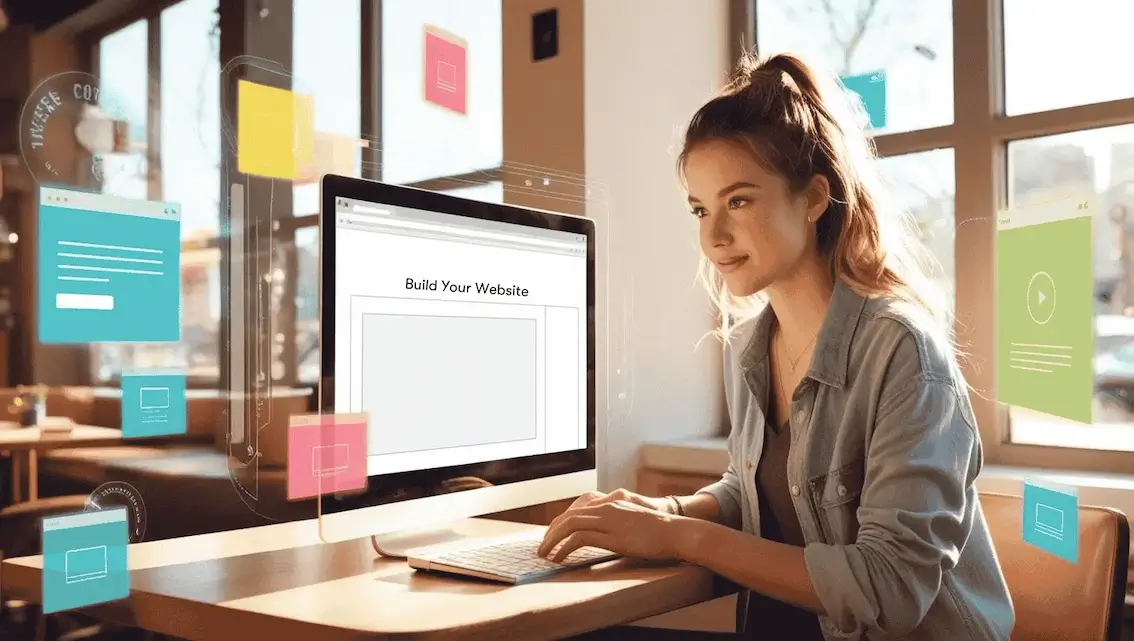
With so many options out there, finding the easiest website builder depends on what you need. Some focus on design flexibility, while others prioritize quick setup and built-in features. Let’s compare the best website builders for beginners so you can find the perfect one for your site.
Best Website Builders for Beginners in 2025

Features
Design
Marketing
Hosting
Multimedia
Good For
Pros & Cons
Pros
Cons

Features
Design
Marketing
Hosting
Multimedia
Good For
Pros & Cons
Pros
Cons

Features
Design
Marketing
Hosting
Multimedia
Good For
Pros & Cons
Pros
Cons

Features
Design
Marketing
Hosting
Multimedia
Good For
Pros & Cons
Pros
Cons
Quick Comparison
| Website Builder for Beginners | Standout Feature | Best For | Platform | Pricing |
| Wix | Most customizable for beginners | Small businesses and personal websites | Web and mobile | Affordable, free plan available |
| Squarespace | Best for stunning templates | Creatives and bloggers | Web and mobile | Moderate, no free plan |
| Hostinger | Best budget-friendly option | New users who want a quick setup | Web | Low-cost, free trial available |
| Shopify | Easiest for online stores | E-commerce beginners | Web and mobile | Higher pricing, built for selling |
Our Top Picks
The right DIY website builder makes setting up a personal blog, an online store, or even a simple portfolio easy and stress free. From Beginner-friendly tools and pre-designed templates to intuitive editors and easy setups, website builders for beginners take the stress out of the process. We’ve rounded up the best website builders for beginners, each offering a smooth learning curve, essential features, and hassle-free setup—so you can focus on building your site instead of figuring out complicated software.
Wix: Best for beginner-friendly customization
 Choose from 800+ designer made templates
Choose from 800+ designer made templates  1000+ innovative small business features
1000+ innovative small business features Wix is hands-down one of the easiest website builders for first-timers. It’s built for complete beginners who want to create a professional-looking site without touching a single line of code. Whether you’re an amateur blogger, a small business owner, or just someone experimenting with website creation, Wix makes the process as beginner-friendly as possible.
The platform offers Wix ADI (Artificial Design Intelligence), which automatically builds your site for you after answering a few simple questions. If you want more control, the drag-and-drop editor lets you move elements around with zero restrictions, making it a great choice for newbies who want creative freedom without technical headaches. Plus, Wix has pre-made templates for every industry, so you don’t have to start from scratch.
Key Features
- Wix ADI (Artificial Design Intelligence). Perfect for complete newbies—just answer a few questions, and Wix automatically creates a site for you in minutes. No design skills needed.
- Drag-and-drop editor. Move text, images, and elements anywhere on the page with zero coding required. Ideal for amateurs who want full control without technical complexity.
- Beginner-friendly templates. Choose from 800+ pre-made templates designed for different industries, so you don’t have to start from scratch.
- Step-by-step guidance. Wix provides easy-to-follow prompts, tooltips, and tutorials to walk beginners through the website setup process.
- Automatic mobile optimization. Your site will look great on any device without needing extra adjustments—perfect for first-timers who don’t want to deal with technical fixes.
- Built-in SEO tools. Wix provides simple, guided SEO settings to help beginners optimize their website for search engines without advanced knowledge.
- One-click apps and integrations. Add contact forms, social media feeds, and e-commerce features instantly from the Wix App Market without any technical setup.
- Free plan to get started. Wix lets beginners test out website building for free before committing to a paid plan.
- Easy blogging tools. If you’re a newbie blogger, Wix has a simple blog editor with easy formatting, scheduled posts, and built-in SEO options.
- Automatic site backups. Made a mistake? No worries—Wix automatically saves your site versions so you can restore a previous version with just one click.
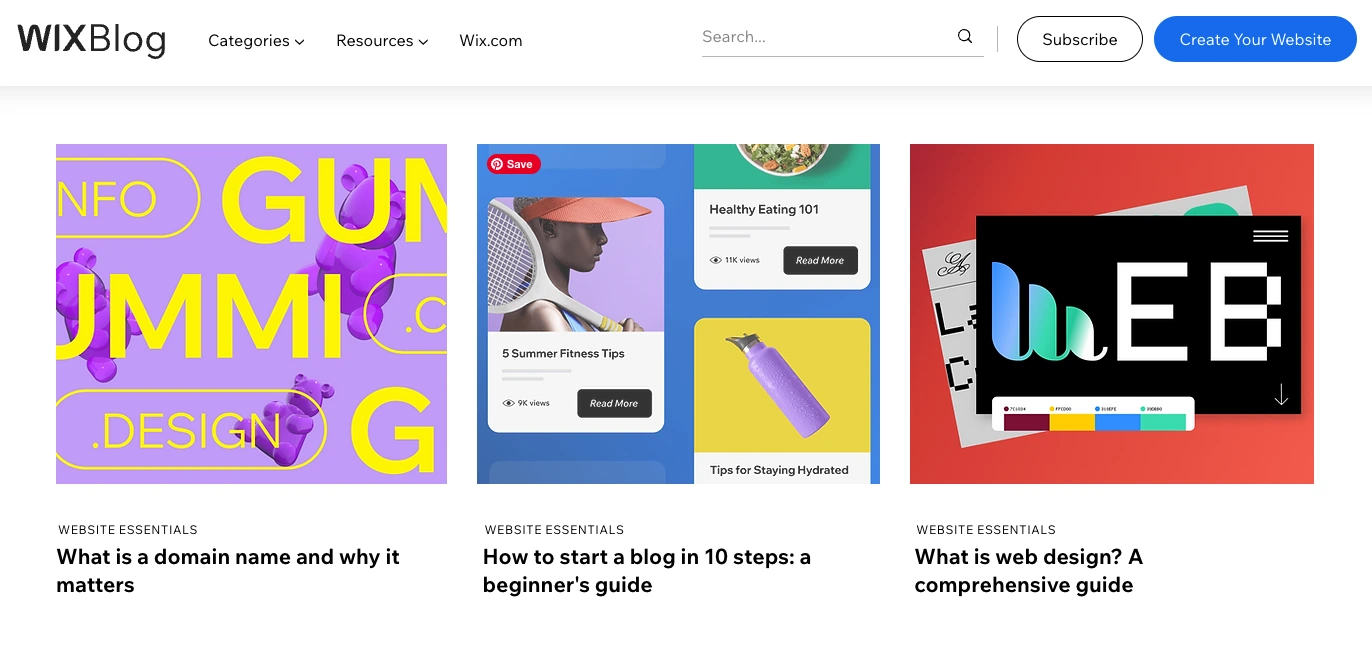
Pros and Cons
- Pros
- No coding required. Drag-and-drop editor makes it perfect for absolute beginners.
- Wix ADI builds your site for you. Ideal for first-timers who don’t want to design from scratch.
- Huge selection of beginner-friendly templates. Ready-made designs tailored for different industries.
- Step-by-step guidance. Wix walks newbies through setup with tooltips and tutorials.
- Free plan available. Try it out before committing to a paid plan.
- One-click apps. Easily add features like contact forms, social media, and e-commerce.
- Automatic mobile optimization. Your site will adjust perfectly on any screen.
- Built-in SEO tools. Simple guides help beginners improve search engine rankings.
- Cons
- Limited template switching. If you want to change your design, you’ll need to start over.
- Free plan includes Wix branding. To remove ads, you’ll need a paid plan.
- Some advanced features require premium apps. Extra functionality may mean additional costs.
Who It’s For
Wix is perfect for absolute beginners, amateurs, and first-time website builders who want a stress-free, no-code way to create a website. It’s ideal for small business owners, bloggers, artists, and freelancers who need an easy website builder without worrying about technical details. If you want a simple, drag-and-drop experience, guided setup, and a free plan to test things out, Wix is one of the best website builders for beginners who want to get online quickly without a learning curve.
Squarespace: Best for stunning templates
 All-in-one platform to power your website
All-in-one platform to power your website  Easy-to-customize website templates
Easy-to-customize website templates If you’re a first-time website builder who wants a sleek, modern, and professional-looking site without coding, Squarespace is a fantastic option. It’s an easy website creator that focuses on beautiful, ready-to-go templates, making it ideal for beginners who care about aesthetics but don’t want to stress over design details.
Unlike some DIY website builders that can feel overwhelming with endless customization, Squarespace keeps things simple and structured, guiding beginners through the setup process. Drag, drop, tweak, and publish—it’s that easy. Plus, with built-in blogging, e-commerce, and SEO tools, you won’t need extra plugins or apps to get started.
Key Features
- Beginner-friendly, designer-quality templates. No need to start from scratch—just pick a stunning template and customize it easily.
- Drag-and-drop customization. Move elements around without coding, keeping the process simple for first-time website builders.
- Step-by-step setup guide. Squarespace walks beginners through every stage, from choosing a template to publishing a site.
- Pre-formatted page layouts. Instead of manually designing pages, use pre-made layouts for portfolios, blogs, or stores.
- All-in-one platform. No need for extra apps—Squarespace has built-in blogging, SEO, and e-commerce tools for a seamless experience.
- Automatic mobile optimization. Every template is mobile-friendly from the start, so no extra adjustments are needed.
- Easy image and gallery management. Perfect for beginners who want to display visuals without complicated formatting.
- Integrated e-commerce features. If you’re a beginner looking to sell online, Squarespace includes simple product listing and checkout tools.
- Built-in SEO tools. No plugins required—Squarespace has easy-to-use SEO settings to help your site rank on Google.
- Free domain for the first year. If you choose a paid plan, you get a custom domain name included for the first year.
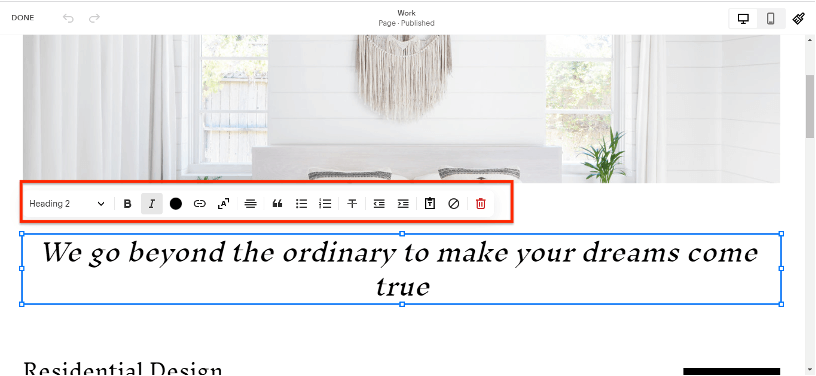
Pros and Cons
- Pros
- Beautiful, high-quality templates. Perfect for beginners who want a professional look with minimal effort.
- Drag-and-drop customization. Easy to edit without coding or design experience.
- Step-by-step guided setup. Walks first-time users through the website-building process.
- All-in-one platform. Built-in blogging, SEO, and e-commerce tools—no extra plugins needed.
- Pre-formatted page layouts. Ready-to-use sections for portfolios, stores, and blogs.
- Automatic mobile optimization. Ensures your site looks great on any device.
- Simple image and gallery management. Great for visual creators who want to showcase their work.
- Cons
- No free plan. You’ll need a paid subscription to publish your site.
- Less flexibility in customization. Templates are structured, so changes are more limited.
- Slight learning curve. While beginner-friendly, it may take first-timers a little longer to get comfortable with the editor.
Who It’s For
Squarespace is perfect for beginners who want a professional-looking website without the hassle of coding or extensive customization. It’s a great fit for creatives, bloggers, small business owners, and freelancers who prioritize stunning design and a clean, structured layout.
If you’re a first-time website builder who wants a simple yet polished site with built-in blogging, e-commerce, and SEO tools, Squarespace makes the process smooth and beginner-friendly. Just pick a template, tweak it, and launch—no tech skills required.
Hostinger: Best for beginners on a budget
 100+ Professional templates
100+ Professional templates  30-day money-back guarantee
30-day money-back guarantee If you’re a beginner looking for a simple, affordable way to build a website, Hostinger is a great place to start. Unlike more complex platforms, Hostinger’s AI-powered website builder takes care of most of the work for you—just answer a few questions, and it automatically generates a ready-to-use website in minutes.
Designed for first-time website builders who want a quick, no-fuss setup, Hostinger keeps things minimal but effective.
Key features
- AI-powered website builder. Answer a few questions, and Hostinger automatically generates a ready-to-go website—perfect for first-timers.
- Drag-and-drop editor. Easily add and rearrange elements without needing any design or coding experience.
- Budget-friendly pricing. One of the most affordable DIY website builders, making it great for beginners on a budget.
- Pre-designed templates. Choose from clean, modern layouts that require minimal editing to look professional.
- Fast-loading websites. Built-in speed optimization ensures that your site loads quickly without extra setup.
- Mobile-friendly designs. Every template is automatically optimized for mobile devices, so your site looks good everywhere.
- Simple e-commerce integration. If you want to sell products, Hostinger offers beginner-friendly e-commerce tools without extra complexity.
- SEO-friendly features. Basic SEO settings help new users improve their site’s visibility on Google.
- One-click domain and hosting setup. No need to connect different services—Hostinger bundles everything in one place.
- 24/7 customer support. Beginners can get help anytime through live chat or email support.
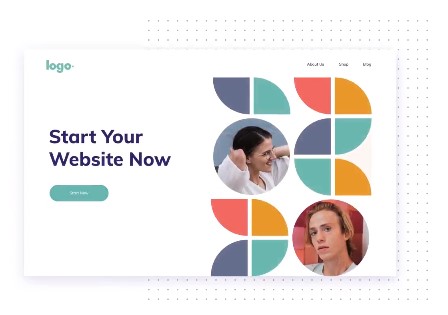
Pros and Cons
- Pros
- AI-powered website builder. Automatically creates a website for you—perfect for absolute beginners.
- Easy drag-and-drop editor. No coding or design skills needed.
- Affordable pricing. One of the most budget-friendly website builders available.
- Fast-loading pages. Optimized for speed without extra setup.
- Mobile-friendly templates. Every site is automatically responsive.
- Simple e-commerce tools. Basic online store features for beginners who want to sell.
- One-click setup. Hosting, domain, and site builder all in one place.
- Cons
- Limited template selection. Fewer design options compared to Wix or Squarespace.
- Less customization. Not ideal for beginners who want advanced design flexibility.
- Fewer built-in features. Lacks some marketing and SEO tools found in other platforms.
Who It’s For
Hostinger is perfect for absolute beginners who want a quick, no-fuss way to build a website without spending a lot of money. It’s ideal for first-time users, small business owners, bloggers, and freelancers who need a simple website with an easy setup and AI-assisted design.
If you’re looking for a budget-friendly, beginner-friendly website builder that gets your site live fast and hassle-free, Hostinger is a solid choice.
Shopify: Best for online stores
 Used by millions of businesses across the globe
Used by millions of businesses across the globe  Fully customizable, user-friendly interface
Fully customizable, user-friendly interface If you’re a beginner looking to start an online store, Shopify is one of the easiest-to-use website builders for e-commerce. Unlike other DIY website builders that focus on portfolios or blogs, Shopify is designed specifically for selling products online—whether it’s physical goods, digital downloads, or services.
For first-time sellers, Shopify takes care of all the technical details, like secure payments, inventory tracking, and mobile-friendly store layouts, so you can focus on what really matters—your business.
Key Features
- Beginner-friendly store setup. Shopify walks first-time sellers through the process with step-by-step guidance.
- Pre-made e-commerce templates. Choose from a variety of ready-to-use store designs, so you don’t have to build from scratch.
- Drag-and-drop store editor. Easily customize your store’s layout, colors, and fonts—no coding required.
- Built-in payment processing. Accept credit cards, PayPal, and other payment methods without third-party setup.
- Easy product management. Add, edit, and organize products with a simple dashboard designed for beginners.
- Mobile-optimized store. Shopify ensures your store looks great and runs smoothly on any device.
- Secure and reliable hosting. No need to worry about website maintenance or security—Shopify handles it for you.
- App marketplace for extra features. Easily add new tools like email marketing, customer reviews, and discount codes.
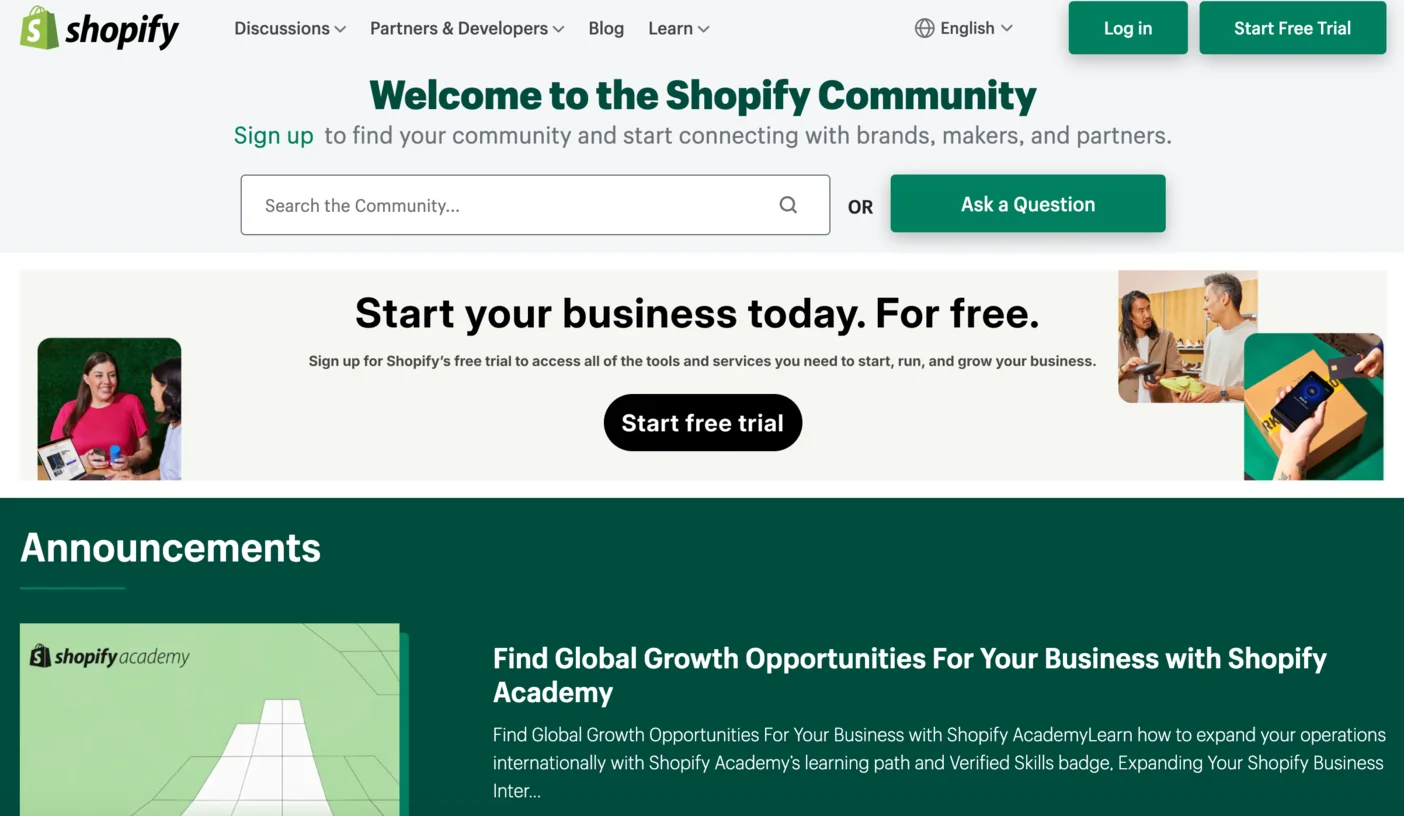
Pros and Cons
- Pros
- Beginner-friendly setup. Step-by-step guidance makes launching an online store easy.
- No coding required. Drag-and-drop customization keeps it simple for first-time users.
- Pre-designed store templates. Professional-looking layouts ready to go.
- Built-in payment processing. Accepts multiple payment methods with no extra setup.
- Mobile-optimized stores. Looks great on any device automatically.
- Scalability. Start small and grow your store as your business expands.
- Cons
- Monthly costs add up. No free plan, and advanced features require paid upgrades.
- Limited design flexibility. Pre-made templates restrict full customization.
- Transaction fees. Additional charges apply unless you use Shopify Payments.
Who It’s For
Shopify is perfect for beginners who want to start an online store without dealing with complex website setup. It’s ideal for small business owners, independent sellers, and first-time e-commerce entrepreneurs who need an easy-to-use platform with built-in payment processing, product management, and marketing tools.
If you’re looking for a simple website builder to sell products online with step-by-step guidance and minimal tech hassle, Shopify is one of the best options for beginners.
How to Choose an Easy Website Builder
Picking the right website builder for beginners comes down to how simple and intuitive it is to use. Whether you’re looking for a DIY website builder or an AI-powered tool that does the work for you, here are a few key factors to consider:
- Guided setup and tutorials. Does the platform offer step-by-step guidance, a setup wizard, or AI assistance to help first-timers get started quickly?
- Editor style. Do you prefer drag-and-drop customization, structured layouts, or an AI-powered tool that builds the site for you?
- Price. Is your budget considered when it comes to purchasing a subscription?
- Ease of navigation. Are all the essential tools (like design, pages, and settings) easy to find, or is the dashboard overwhelming?
- Built-in features vs. extra apps. Does the builder include SEO, blogging, and e-commerce tools, or will you need third-party plugins?
- Support options. Is there 24/7 customer support, video tutorials, or community forums to help beginners troubleshoot issues?
- Trial and pricing flexibility. Does the platform offer a free plan or a trial period so you can test it before committing?
At the end of the day, the best website builder for beginners is one that fits your comfort level and website goals. Taking advantage of free trials and test-driving different platforms can help you find the one that feels easiest to use.
What Makes the Best Free Website Builder for Beginners?
A free website builder is a great way for beginners to get started without financial commitment, but not all free plans are equal. The best easy website builder should offer:
- Beginner-friendly design tools. A drag-and-drop editor or AI-powered site creation makes it easy for first-timers to build without coding.
- Customizable templates. A good DIY website builder should provide pre-made templates that are easy to tweak.
- Mobile responsiveness. Your site should automatically adjust to different screen sizes without extra work.
- No hidden costs. Some “free” website builders require upgrades for essential features—look for ones that offer a solid free plan without major limitations.
- SEO and basic marketing tools. Even on a free plan, the builder should provide basic SEO settings and simple marketing tools to help beginners grow their site.
- A smooth learning curve. The best free website builder for beginners should feel intuitive, not overwhelming, with clear setup instructions and support.
While free plans are a great starting point, keep in mind that many beginner-friendly website builders offer affordable upgrades with better features as your site grows.
Building Your First Website: What Beginners Need to Know
If you’re creating a website for the first time, keep these key points in mind to make the process smoother and stress-free:
- Plan before you build. Before jumping into a website builder for beginners, decide on your site’s name, purpose, and overall look. Having a clear vision will make the design process much easier.
- Use a website builder. Hiring a developer is expensive, but DIY website builders are affordable and easy to use. Platforms like Wix and Squarespace provide drag-and-drop tools and pre-made templates to simplify the process.
- Think about your audience. Who do you want to visit your site, and what do you want them to do? Keeping your audience in mind will help guide your design choices.
- Don’t stress the learning curve. Most easy website builders come with step-by-step guides, tutorials, and support teams, so you’ll never be stuck for long.
- Prioritize design and branding. Your website is your digital first impression. Use high-quality images, videos, and branding elements to make it visually appealing and engaging.
- Optimize for SEO. To help people find your site, use SEO-friendly website builders with tools for keyword optimization, metadata editing, and fast-loading pages.
Final Thoughts
Building a website as a beginner might feel overwhelming at first, but with the right easy website builder, the process becomes simple, intuitive, and even fun. Whether you’re creating a personal blog, portfolio, or online store, there’s a platform that fits your needs without requiring technical skills.
The key is choosing a beginner-friendly website builder that offers guided setup, drag-and-drop customization, and built-in features to make launching your site effortless. Take advantage of free trials, tutorials, and support resources, and don’t be afraid to experiment—you’ll be surprised at how quickly you can create a professional-looking site with no prior experience.
The best way to get started? Pick a platform, dive in, and build!
FAQ
Q: What is the easiest website builder for beginners?
A: Wix and Squarespace are two of the easiest website builders for beginners. They offer drag-and-drop editors, guided setup, and pre-made templates to simplify the process.
Q: Can I create a website with no experience?
A: Yes! Many DIY website builders are designed for first-time users, requiring no coding or design experience. Platforms like Wix, Hostinger, and Shopify walk beginners through every step.
Q: Is it free to build a website?
A: Some free website builders let you start at no cost, but free plans often come with limited features, ads, and no custom domain. Paid plans offer more flexibility and a professional look.
Q: Do I need to know coding to build a website?
A: No, modern website builders are completely code-free, allowing you to drag, drop, and customize your site with ease.
Q: What should I look for in a beginner-friendly website builder?
A: Look for drag-and-drop editing, pre-designed templates, SEO tools, customer support, and mobile-friendly design to ensure an easy experience.
Q: Can I change my website builder later?
A: While possible, switching platforms can be tricky. It’s best to choose a website builder that fits your long-term needs from the start.
Q: How long does it take to build a website?
A: With beginner-friendly website builders, you can create a basic website in a few hours. Customizing it further depends on your needs.
Q: What’s the difference between a website builder and WordPress?
A: Website builders like Wix and Squarespace are easier for beginners, while WordPress offers more customization but has a steeper learning curve.
Q: Which website builder is best for an online store?
A: Shopify is the best for beginners starting an e-commerce business, while Wix and Squarespace also offer solid online store features.
